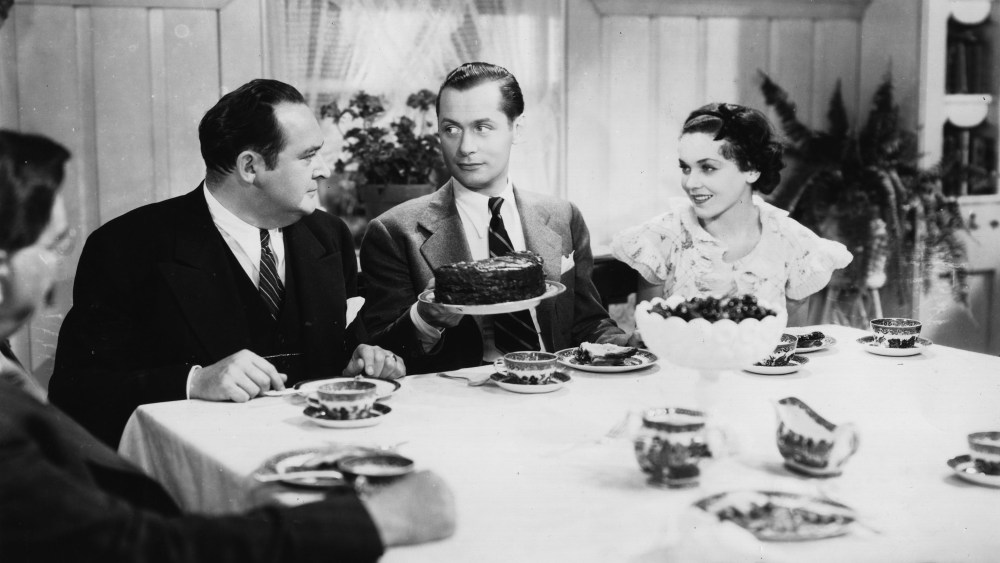The Hungarian Countess Louise J. Esterhazy was a revered — and feared — chronicler of the highs — and generally lows — of fashion, society, culture and more. It seems the Esterhazy clan by nature is filled with strong opinions, because WWD Weekend has now been contacted by the Countess’ long-lost nephew, the Baron Louis J. Esterhazy, who has written from Europe to express his abhorrence of numerous modern fashion and cultural developments. The Baron’s pen is as sharp as his late aunt’s and here is his latest column on the not-always-warm summer season.
“Manners Maketh Man.”
You May Also Like
Or so said William of Wykeham, bishop of Winchester, over 700 years ago. But today I find that, depending on the places you frequent and the people with whom one keeps company, “good” manners and “polite” customs can vary dramatically.
For instance, the General Quartier Meister (aka the German wife), firmly adheres to the Continental habit of placing the dessert (or “pudding,” and therein lies a whole other debate) spoon and fork above the plate setting when laying the table. Having all grown up deep in the British boarding school system, the Esterhazys have developed the English habit of placing those pieces of cutlery on the inside of those laid out for the first and main courses.
This debate raged on, until we recently attended a dinner at Buckingham Palace (yes, dear reader, I had to drop that in) for about 30 people, given on behalf of a charity that we vigorously support. As we stood waiting for our royal host to be seated, the lady on my right turned to me and whispered: “There appears to be a woman further down the table trying to get your attention.”
I looked up to see the General Quartier Meister clicking her fingers in my direction, as if I were a dog being called to heel, and gesticulating theatrically to the table setting before each of us. There, indeed, were the dessert spoon and fork nestled atop the place setting. She gave me a triumphant smile. “Well, the British royals are German after all,” I pointed out as we left the palace later that night.
“And so says the Hungarian,” she countered.
Fish knives and forks are another minefield of manners. I am rather fond of our fetching-bone-handled 1920s pescatarian cutlery. They look handsome on a well-laid table — or so I thought until an all-too-stuffy dinner guest advised us to “get rid of them, as they are a sad 19th-century middle-class affectation, designed solely to distinguish them from the working classes.”
You may be pleased to know that we kept our cutlery and instead quickly disposed of our beastly snobbish friend.
Speaking of knives and forks, plenty of Americans have a manner which many a Euro finds quaint, if not a tad baffling. The food on the plate is diligently cut up into bite-sized pieces and then the knife is laid down on the top right side of the plate — at about one o’clock, as it were. The fork switches hands and the dish is then consumed solely deploying the fork. I was once informed that this habit stretches back to early colonial times, when many households might only possess one or two well-sharpened knives and hence the need to share. So, once used, the knife was then put down, ready for the neighboring eater to pick up and use in turn. Quaint, no? And it proves that many manners stem from logical purpose.
Some manners just come from consideration for others. I heard a marvelous story of a young teenage man visiting a very grand house in Ireland in the 1930s. After a few days, he noted some underpants were still left unattended in the depths of the laundry basket. Upon approaching the maid and asking if they might be washed, she answered, in a thick Irish brogue, “Well, young master, what with the carelessness on the back and wickedness on the front, I am not about to wash them underpants.”
Which brings me to a man I know, worth Croesus-like sums of money, who insists upon washing his own underwear before they go into the laundry, for fear that his staff may think less of him should they be unduly “soiled!” Now, that is manners in extremis.
That same fellow — who vacations in a truly magnificent yacht, crewed by a team of six — always makes his own bed every morning (like most of us, of course) and indeed, makes it so well that the crew sometimes wonder where he slept.
While I don’t go that far, I do always make an effort to leave any guest or hotel room in a good state. I straighten the bed, rehang damp towels and generally look back to ensure that when the housekeeping team or the domestic staff enter the room to do their job, they won’t think the last occupant was a total and utter slob.
Lucky enough to have a lovely summer home near a glorious beach, our multiple guest rooms are like a revolving door from June to September and I am all too frequently amazed at how rooms are left after a guest visit. Why leave the bedclothes balled up as if rutting skunks had occupied the room? And don’t get me started on wet towels strewn across the bathroom floor. “Damned rude,” I say.
My father always insisted it was bad manners to talk of religion, politics or money at the table. That was perhaps because of his indolence toward the first, paranoia of the second and lack of the third. Sex and the topic of other people’s mistresses were his preferred conversational gambit. For many, sport is the safe and polite route of conversation, but with two left feet, I struggle with that one. As a result, the General Quartier Meister deplores my hopeless small-talking abilities and says I lack “manners!”
Standards of politeness do change over time and one person’s custom should not necessarily be frowned upon by others. For instance, quite rightly, the editor of this august title categorically prohibits the use of any curse words. Even a relatively mild reference to a bodily function has been edited out of prior pieces and the “F word” is unthinkable. However, ask the editor of The Financial Times if that is a shared view. Not at all. The pink paper, a bastion of global quality reporting, is these days liberally littered with the “F word,” albeit always when quoting an individuals words.
For instance, in all European society, the wearing of black tie (or “tuxedo,” to Americans) in church for a wedding, for instance, is considered extremely poor manners. You dine and dance in black tie, but formality in church requires a traditional “morning coat.” As if our God is up there, keeping score on our fashion sense of proprieties under His roof? I have been to many an American wedding, from Houston to the Hamptons, decked out like Fred Astaire and no one bats an eyelid — and I have not heard from the Fashion God, either. And then there’s the American golf club tradition of furiously tucking your polo shirt deep and tightly into your belted shorts. God forbid your shirt is worn loose, as many a European will do in the warmer summer months. A loose shirt worn on American links might make the other golfers wonder if you left your manners with the 4×4 in the parking lot.
Of course, there are scores of past “manners” that are today scorned, often relating to equality. No longer does one hear “I now pronounce you man and wife,” replaced by “husband and wife,” or other variations. Rightfully so.
Given that, today it probably should be “Politeness Maketh People,” or “Kindness Maketh Kith.”



